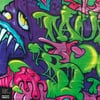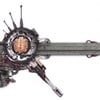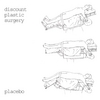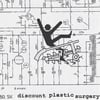
Image Line (yeah, the company that makes Fruity Loops, or FL Studio as it's called now) have a new drum synth that's in public beta now: Drum Matrix Public Beta. It uses physical modeling for the sound engine, and it sounds remarkably good. It uses the same model for everything from bass drums to cymbals, but it does a good job of making a whole range of sounds. The sounds it makes are more "electronic" sounding than realistic, but I like that.
In the beta version, you get a nag screen every now and then, and using multiple outputs doesn't seem to work. It has an eight-band fixed-frequency EQ on the output section, which I think is a great idea for a drum synth. It advertises the ability to use separate outputs for each sound, but this doesn't seem to work in the beta. Hopefully in the release version, there will be a separate EQ for each output, instead of just applying it to the mains.
Audio Damage has also released a new drum synth, called Tattoo, that is more focused on xOx type sounds. In contrast to Drum Matrix, each type of sound (kick, snare, hat, etc.) has its own set of synthesis parameters. The built-in step sequencer on Tattoo is also a lot more sophiticated: each parameter for each sound gets its own dedicated modulation sequencer with a randomization options.
One feature I think is a great idea is that you can run Tattoo's sequencer via "note sync" where it's clocked to midi note messages. That way, if you have some kind of groove pattern in your host sequencer, you can have Tattoo match the rhythm but still use the built-in modulation sequencers and drum-machine style pattern editing.
I haven't used Tattoo, but the audio demos are impressive and Audio Damage puts out consistently quality stuff at more than reasonable prices.
I've been using Logic's Ultrabeat for sequencing beats a lot lately, and I've come to like that style of sequencing beats a lot more than pushing blocks around on a piano roll. FLStudio, and now the new version of Sonar have integrated step sequencers. I think plug-ins like Drum Matrix and Tattoo, as well as stuff like Numerology (an awesome, modular, MIDI step-sequencing environment) are part of a come-back of this type of sequencing. I think Ableton helped show that novel approaches to sequencing can really change the way people work and make writing more fun, and I hope we'll continue to see extensions of that.







thanks for that! drumatrix is insanely fun. it's more like an imteractive toy than a computer program, which is how a good drum machine should be.
ReplyDelete